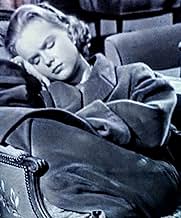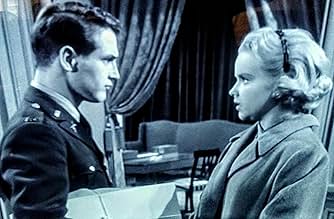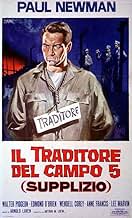Un héroe condecorado de la Guerra de Corea colabora inexplicablemente con el enemigo mientras está enterrado en un campo de prisioneros de guerra y es sometido a un consejo de guerra.Un héroe condecorado de la Guerra de Corea colabora inexplicablemente con el enemigo mientras está enterrado en un campo de prisioneros de guerra y es sometido a un consejo de guerra.Un héroe condecorado de la Guerra de Corea colabora inexplicablemente con el enemigo mientras está enterrado en un campo de prisioneros de guerra y es sometido a un consejo de guerra.
- Dirección
- Guión
- Reparto principal
- Law Officer
- (as Robert Simon)
- Courtroom Spectator
- (sin acreditar)
- Skinny
- (sin acreditar)
- Student
- (sin acreditar)
- Family Member
- (sin acreditar)
Reseñas destacadas
If theres a conflict that threatens the security, of the U. S., thats different. But no more 3rd world esoteric, thinly constructed conflicts, in which the ones deciding are future employees of the weapons industry (read Eisenhower on the military industrial complex, and its threats to America).
Way too cozy, classic conflict of interest, having those who'll gain, personally opting to jump in.
This movie, is set on that back drop....tangentially, with a young man (boy), no mom, military dad, trotted down the path to glory. Only his "glory" is in a courtroom, where his behavior is judged by many who never faced what he did,
It was trials like this one that led to a reexamination of the expectations, of a soldiers behavior once hes taken prisoner.
Among films based on courtroom trials this one is remarkable. It rates alongside Bruce Beresford's Australian film "Breaker Morant" and the British film "Term of Trial."
A major feather in the cap is the ending, which is a clever touch by the director Arnold Laven. Any other ending would have made the film less poignant.
The development of the relationship between Newman's character and that of Annie Francis' Aggie is again worthy of note. Lee Marvin's small role catches your attention though it is not his finest by any measure.
All in all this film should be given more publicity, as the theme is relevant today as it was when it was made.
¿Sabías que...?
- CuriosidadesRod Serling took 19 months to complete the teleplay, the longest he ever spent writing a single screenplay. It also took seven re-writes to get to the final version, the most of any of his screenplays.
- PifiasIn the closing scene inside the courtroom, Capt. Miller (Lee Marvin) conspicuously comes in and sits down in a chair right next to the door, against the back wall. We see him there in a couple of close-up shots, but in several wide camera shots taken from the front of the courtroom, he is nowhere to be seen.
- Citas
Lt. Col. Frank Wasnick: [Addressing the jury, presenting the closing arguments for Capt. Hall's defense] Gentlemen, I have here a document which is not very pleasant to read. It's a communiqué written by the Communists describing shortcomings they observed among certain American prisoners of war.
Lt. Col. Frank Wasnick: [Quoting from the document] "One: Many of the prisoners reveal weak loyalties to their families, their communities, and their army. Two: When left alone, they tend to feel deserted, and they underestimate their ability to survive, because they underestimate themselves."
Lt. Col. Frank Wasnick: Now, the report goes on to say that even some of our university graduates have a very dim idea of American history and of the strengths and weaknesses of American democracy and that they are virtually ignorant of Communism, because we have never taken the trouble to inform them of its nature. The Communist program of indoctrination was based on this appraisal - and succeeded, because in many cases, the appraisal was true... And now we must judge Capt. Hall. Gentlemen, if there is guilt, where does it lie? In that small number who defected under pressure, as Capt. Hall did? Or do we not share it? At least those of us who created *part* of a generation which may collapse, because we have left it uninspired, uninformed, and - as in the case of Capt. Hall - unprepared to go the limit, because he had not been given the warmth to support him along the way... And now we must judge Capt. Hall. And let us make absolutely certain, that we have had no part in his collapse. This man has proven himself in the two wars of his youth, who has been exposed to conditions of captivity, against which we have never had to test ourselves.
- Versiones alternativasExists in a computer-colorized version.
- ConexionesReferenced in American Masters: Rod Serling: Submitted for Your Approval (1995)
Selecciones populares
- How long is The Rack?Con tecnología de Alexa
Detalles
- Fecha de lanzamiento
- País de origen
- Idioma
- Títulos en diferentes países
- The Rack
- Localizaciones del rodaje
- Letterman Army Hospital, Presidio, Golden Gate National Recreation Area, San Francisco, California, Estados Unidos(exterior scenes at the army hospital)
- Empresa productora
- Ver más compañías en los créditos en IMDbPro
Taquilla
- Presupuesto
- 779.000 US$ (estimación)
- Duración
- 1h 40min(100 min)
- Color
- Relación de aspecto
- 1.85 : 1




































